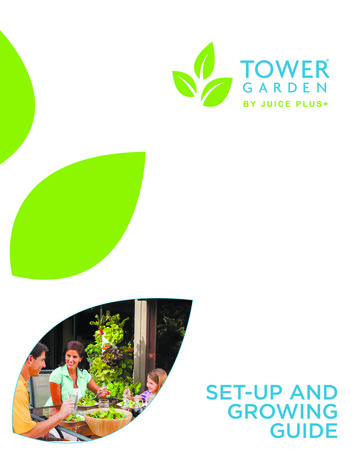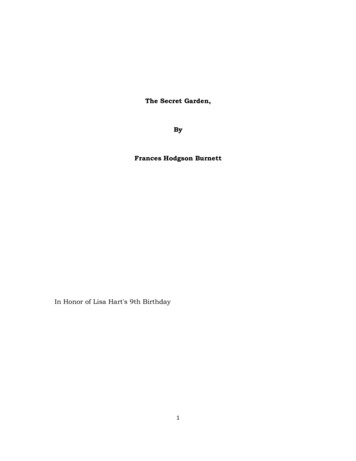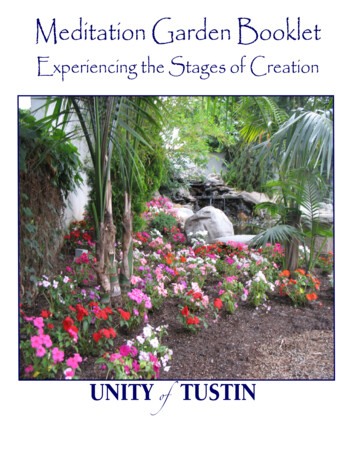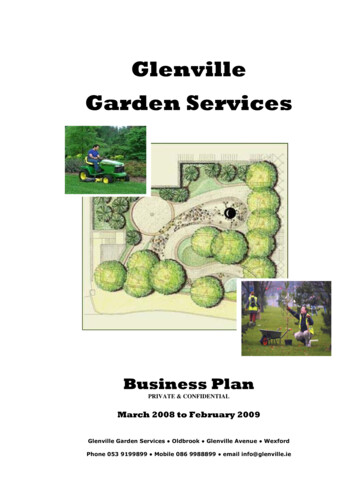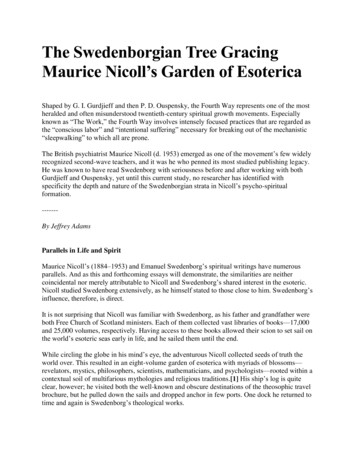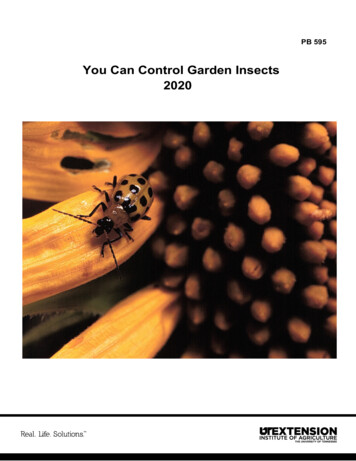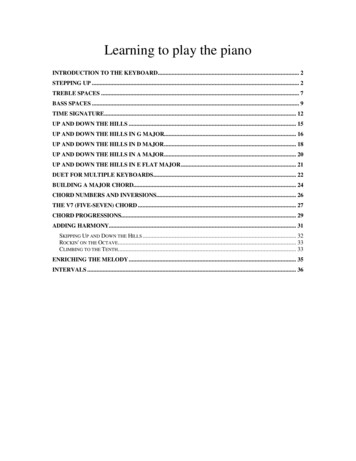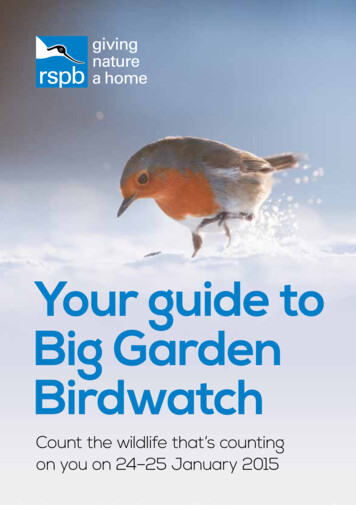
Transcription
Your guide toBig GardenBirdwatchCount the wildlife that’s countingon you on 24–25 January 2015
Take part in BigGarden BirdwatchEvery year, up and down the country, peoplewatch the birds in their gardens and reportwhat they see. Come and join us all this year!How to do it2 Let us know what you see by completing the enclosed form or using“hear the“ Irustlinglong1 It’s wonderfully simple. Just count the birds in your garden or local park for an hour. Record the highest number of bird species you see at thesame time.before I see her.She’s my spiky littlegardener’s mate.the live bird counter at rspb.org.uk/birdwatch Here you can also findout all you need to know about taking part, share your sightings andenjoy general Birdwatch chat with our community group.Why do it?The results of the Birdwatch help us to spot problems, but they also helpus find ways of putting them right. The decline in house sparrows couldbe due to a lack of food or habitat, which is why we encourage people tofeed their garden birds. But it’s not just birds that are facing tough times:it’s also other wildlife, such as hedgehogs. So a section of the Birdwatchform asks you about the other wildlife that you’ve seen in your garden.Ray Kennedy (rspb-images.com)Edwin Kats (rspb-images.com)Count the wildlife that’s counting on youThe Birdwatch hasrevealed alarmingthings. Birdwatch datahas told us we havelost a staggering62% of our housesparrows since 1979.
Join the largestwildlife surveyThank you for taking the first step and findingout more about Big Garden Birdwatch: theexciting annual snapshot of our birds and wildlife.About the birdwatchThe Big Garden Birdwatch is the world’s largest wildlife survey andthousands of people take part every year. It started as a children’s activityin 1979, and it’s really simple: just watch your garden birds for an hour andtell us what you see. The survey hasn’t changed in that time, so we nowhave thirty-five years of data on how our garden birds are faring.Join a cast of thousandsToday, over half a million people regularly take part. We comparethe data year-on-year, so every single response is vitally important ingiving us a big picture of how our garden birds are doing over a single day.Adam, Huddersfield“But look closelyand there’s somuch wildlifehiding there.““I love hearing thebirdsong as I walkto work, so watchingthem for an hour isa real treat.”It’s just mysmall patch.Paul CliffGenevieve Leaper (rspb-images.com)And this year, you’ll be joining us!
Getting ready.Create a bird caféYou’ll see more birds if they’ve got a reason tocome to you. The first step is to make your gardena tasty spot for dinner!The good news is that it’s reallyeasy. Different garden birds likedifferent kinds of foods, fromshop-bought fat balls to thingsyou might have at home.From your cupboardDad sayshe’s greedyTry putting mild grated cheese,cake, cooked potato, currants,fruit, pastry, dry porridge oatsand sultanas on your bird table.“but I know he’llbe eating for sixcome April. Sunflower hearts. These are fullof energy and ideal for nearly allgarden birds. You can put themin a feeder, on a table or simplysprinkle them on the ground.RSPB sunflower hearts are now‘Fair to Nature’ accredited. Suet balls. These are a greatfood in winter when birds needhigh-fat foods in order to fightthe cold over the chillier months.For more great food ideas, visit rspbshop.co.ukRay Kennedy (rspb-images.com)Paull Cliff“Have a look for bird food youmay be hiding in your kitchen.From the RSPB shop“My seven-year-olddoesn’t normallysit still for long,but he’s alwaysfascinated by thebirds that visit us.”Harriet, Biggleswade
Getting ready.Getting ready.Now you’ve started feeding your garden birds,you’ll probably find they’ll be returning. Hereare two other things you can do to help them.Whatever the space you have, there are manythings you can do to make your garden morebird and wildlife friendly.ThirstyNatural foodMake them welcomeIt’s a good idea to give birdssomething to drink too, as theyneed water to drink and cleanthemselves. Again, this doesn’tneed to be expensive orcomplicated: a shallow bowlwith water is ideal.A place to stayYou’ve started attracting birds bygiving them something to eat.Now see if they will make yourgarden a place to stay by puttingup a nestbox.If you’re lucky enough to have birdsusing your nestbox in the first year,make sure you give it a goodclean-up in the autumn after theinhabitants have left, so the birdsthat use it next can start out witha clean home.A variety of nestboxes areavailable from rspbshop.co.ukDon’t forget to tell us about the otherwildlife you have seen in your garden.Different varieties of trees, shrubsand flowering plants provide nectarand other food sources for insectsthroughout the year. Try plantinghawthorn: it’s a food plant for morethan 150 insect species!Many plants will add colour toyour garden, and supply anamazing birds’ buffet.Try planting apple or crabapple,honeysuckle, ivy, lavender, rowan,sunflower, teasel and grey willow.Give the mower a restBerry goodIt’s not just about what you plant– leaving a section wild is great too!These shrubs and trees grow tastyfruit and berries for birds.Kick back and leave a corner ofyour garden uncut to encourage tallplants and weeds. This will createa habitat for a range of wildlifeincluding bees, caterpillars of manybutterflies and moths, hedgehogsand even frogs and toads.Try planting alder buckthorn,buckthorn, cherry, climbing rose,elder, hawthorn, hedge barberry,holly, spindle, white dogwood,wild privet or yew.Mike Lane (rspb-images.com)Nestboxes appeal to many birdsand can be fixed to most thingsyou’re likely to have in your gardenalready: walls, fences and trees.They come in all shapes and sizes:have a look at rspbshop.co.ukto see the variety on offer.If you put one up now, they mightbe occupied come the spring but ifnot, then there’s always next spring– birds do not always change theirnesting spots every year.Eleanor Bentall (rspb-images.com)There’s nothing better than knowingthat a family of birds has madeyour garden their home, and awonderful spring sight is parentstirelessly feeding their hungry,open-mouthed chicks.Garden for wildlife“A gang of fluffylong-tailed titswere my stars ofthe show last year.”Natasha, Bedford
Edwin Kats (rspb-images.com)Give nature a homein your gardenAs part of the Birdwatch, we ask you about otherwildlife in your garden too. Nature is in trouble:we need to look after all of it.Make a mini-pondBuild a bug hotelDead and rotting wood provides ahome where fungi, mosses andlichens can grow. As it decays, a pileof wood becomes a bug hotel for avarity of bugs. So whenever youprune, add the cut branches to thepile. If you have a balcony, fill awell-drained bucket with soil andwood chippings to attract bugs.To make it even better, you couldadd a couple of small rottingbranches and put it next to flowers.The creepy crawlies will love it!Adding a pond to your garden is oneof the best ways of giving nature ahome, and the best thing is youdon’t even need a lot of space todo it! A mini-pond could attractdragonflies, frogs and pond skaters.Get a washing up bowl, then addgravel to the bottom. Add rocks onone side to help animals climb inand out. Finally, add in a nativeoxygenating plant such as hornwort.For more ways to give naturea home in your garden, visitrspb.org.uk/homesAndy Hay (rspb-images.com)“It’s my chance justto sit and enjoynature, knowingthousands of othersare doing it too.”Sheila, Saffron Walden“ Hearing that littleHe’s my prince.‘quark quark’ callat the end of theday puts my worldat one.“Here’s some simple ways to givenature a home in your garden.
Ready to dothe Birdwatch?“ YesterdayLook at that.“they knew ‘bird’,today they know‘sparrow’.You’ve followed the tips in this booklet and you’reall prepared for Big Garden Birdwatch, and how tostart giving nature a home.On the day.Over the weekend of 24–25 January 2015, why not use our online birdcounter at rspb.org.uk/birds? As your hour starts, record the birds as yousee them directly on your laptop, tablet or smartphone. Just start the timerand once your hour is up, all you need to do is press “send”. And rememberto join in the conversation at #birdwatch. You can also send in your resultswith your paper form.If you spot something you’re not sure of, use the pictures on your formor look at rspb.org.uk/birdidentifier.and afterwardsBen Hall (rspb-images.com)It’s a sad fact that nature is in trouble. But there are always things we cando. Everyone needs to act now, and Big Garden Birdwatch is just the start.No matter how big or small your garden, we can all work together to givenature a home. Have a look at rspb.org.uk/homes for simple ways youcan join the community and build special places for nature in your garden.“Such a simple hourof watching, but itkeeps me smiling forthe rest of the day.”Phil, Liverpool
Ernie Janes (rspb-images.com)We give naturea homeAll over the UK, the RSPB is working round theclock to save nature and special places. Here’sa bit more about what we do.We believe everyonecan do their bitWe campaign for natureIf we all pull together and take smallactions for wildlife in our gardensand outdoor spaces, we can makea real difference for nature. It’s whatwe do on our reserves, and you cando it at home, too. Take a look atrspb.org.uk/homesWe protectimportant placesOur campaigner, a red squirrel calledBob, has been working his squirrelsocks off to ask people to “Vote forNature” before the next GeneralElection. For more details about Boband what he’s been up to, have alook at voteforbob.co.ukWe don’t do it aloneWe work with landowners, farmers,businesses and other environmentalorganisations to make more spacefor nature across the UK. Because ifthere’s more nature, we all benefit.David Tipling (rspb-images.com)“A guilt-free indulgenthour to forgeteverything. It’s justme and the birds.”Chris, Londonsky,“Bigthe sound of waves“We look after a staggering 200 nature reserves and they’re allteeming with wildlife. Why notcome and visit one near you?and that gorgeouslight. Better than cake.
Rahul Thanki (rspb-images.com)Count thewildlife that’scounting on youJoin in the conversation at#birdwatch and follow us at:RSPBLoveNature@natures voicerspb love naturerspb.org.uk/birdwatchCover by Andrew Parkinson (rspb-images.com). The RSPB is a registered charity in England & Wales207076, in Scotland SC037654.356-0666-14-15CR1124239IN01 406831
Count the wildlifethat’s counting on you1 Watch the birds in your garden or local park for one hour.The more people watching the better – so why not inviteyour family and friends?2 Record the highest number of each bird species you seeat the same time – not the total over the hour as birds mayvisit more than once.3 Only count the birds that land in your garden or park,not those flying over.4 Once your hour’s up, fill in the details for other wildlife thatvisits your garden or park during the year.5 Tell us what you’ve seen! Even if you don’t see any birds,we still need to know, as it’s really useful information.6 Return the form (FREEPOST) to the address at the bottomof the page.Name of birdJoin thousands of others and discoverthe wildlife in your garden for an hourover 24–25 January 2015.Most seen at one time Other wildlifeBlackbird.Blue tit.Chaffinch.Coal tit.Collared dove.Dunnock.Goldfinch.Great tit.Greenfinch.House sparrow.Long-tailed tit.Magpie.Robin.Starling.Woodpigeon.Other speciesPlease use CAPITAL letters.Title (Mr, Mrs, Miss, Ms, etc)First nameLast nameAddressTownCounty/Council areaPostcodeTelephoneMobileE-mail (over 18s only)Date of birth if under 18Big Garden BirdwatchYou may not see these creatures in your hour watching(especially hedgehogs, slow worms and grass snakes whichare hibernating now), but we’d like to know if any of them visityour garden or park and, if so, roughly how often. Please putthe appropriate letter in the box next to the animal.A daily, B weekly, C monthly, D less than monthly,E never, F don’t knowBadger.Hedgehog.Grey squirrel.Red squirrel.Muntjac deer.Roe deer.Slow worm.Grass snake.How many people took part?AdultsChildrenWe respect your privac
Your guide to Big Garden Birdwatch Count the wildlife that’s counting on you on 24–25 January 2015

